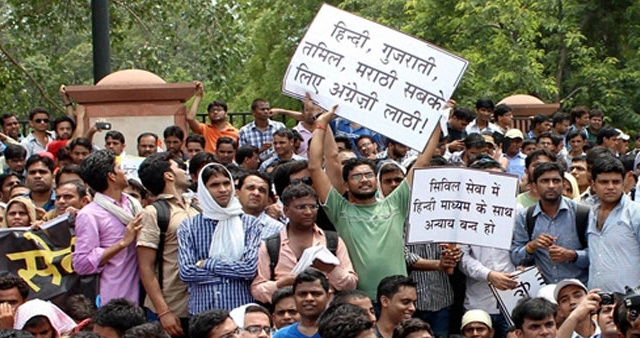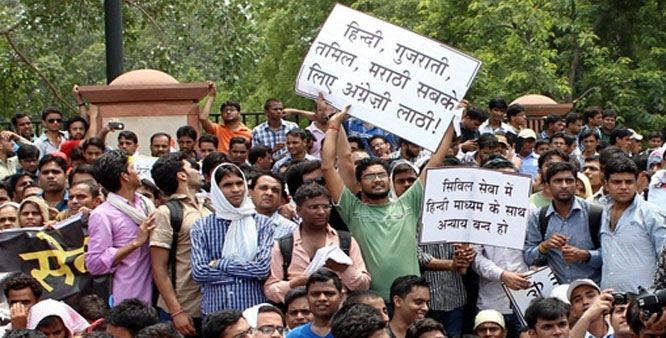The divide between India and Bharat is only widening. Language with its hegemonic power does have a significant role to play in erecting the wall between the elites and the masses. Can this hegemony be transcended or is language destined to become the new status symbol of modern India?
The official languages for the Capital City of Delhi are English, Hindi, Punjabi and Urdu however with the growing assertion of only English as a medium of communication especially within classrooms and centres of higher learning has resulted in many problems for the students of Hindi and other vernacular mediums largely from small towns and marginalised communities.
When English is the most widely used language in terms of academic activities ranging from seminars and lectures to available reading materials and examinations – the students who are uncomfortable or unequipped with English proficiency are the real suffers.

The scheme of remedial classes which may be held in Hindi and which aim at helping those who are uncomfortable understanding lectures in English or comprehending textbooks in it is often not enough to compensate the huge discrepancy between them and the city bred English speakers.
The hindrance that the language has caused has resulted in a sense of perpetual marginalization and growth of slow self-esteem be it among the speakers of Hindi or other Indian vernaculars. It is ironic that so far we have not been able to come up with an archive of all important books, resources and reference materials in languages other than English and yet we dream to make the education system egalitarian and inclusive. The deeper questions that arise therefrom are whether education perpetually destined to retain the divide between India and Bharat as symbols of two distinct social classes, is there enough infrastructural initiative being taken to challenge the hegemony of English language and to encourage expression in the vernacular?
After 200 years of colonial rule and an exploitative regime that thrived on the denial of all forms of vernacular knowldeges and traditions why do we still find ourselves entrapped by the dead weight of history? Why do we still feel the inferiority complex when faced with Western languages, sciences and technologies? Where is our lost confidence?
In a country that is home to millions of ordinary men and women who often lead lives on the verges of marginalization, exploitation and perpetual poverty why do we allow English as not only a language but rather as a symbol of class and status to increase the divide even further?
Is English a language among many others or is English the promise of a better future?
The question before us is that if we are a land that prides itself on its diversity of cultures and languages then why in terms of our everyday existence we feel under confident of that very diversity? If a Frenchman takes pride in his culture and does not feel embarrassed at not knowing English well enough then why does somebody from Bhojpur or Odisha have to? Is it not a paradox that despite being a country of so many languages there is so much of pressure to live, speak and take pride in a language that is a colonial inheritance?
Yes, look at our universities and educational institutions where lectures generally take place in English, where reading material is available in English, where examinations need to be written in English, and even interviews are taken in English in this circumstance how do we expect to bridge the growing divide between India as a fast growing economy and an emerging superpower and a Bharat where even people’s basic necessities are not yet met? Is it enough to say that we encourage multi -lingualism or is it also important to create the right infrastructural base for students and young learners to express themselves in a language they are comfortable in and yet excel in what they do. The point being asserted is that language is a medium of expression and it should not be turned into the criteria for allowing expression; let each individual enjoy the autonomy to express herself in her own way. Only when we create an ambience that allows this can we prosper as a truly multi-lingual, multi-cultural and democratic space. It begins at an individual level; it begins by learning a language not to hegemonize over others but by acknowledging that it is only another medium of expression. This way we will be able to contribute towards building a bridge of communication between the divided selves of the nation.
Due to its contemporary relevance we are again publishing this article.
The New Leam has no external source of funding. For retaining its uniqueness, its high quality, its distinctive philosophy we wish to reduce the degree of dependence on corporate funding. We believe that if individuals like you come forward and SUPPORT THIS ENDEAVOR can make the magazine self-reliant in a very innovative way.













